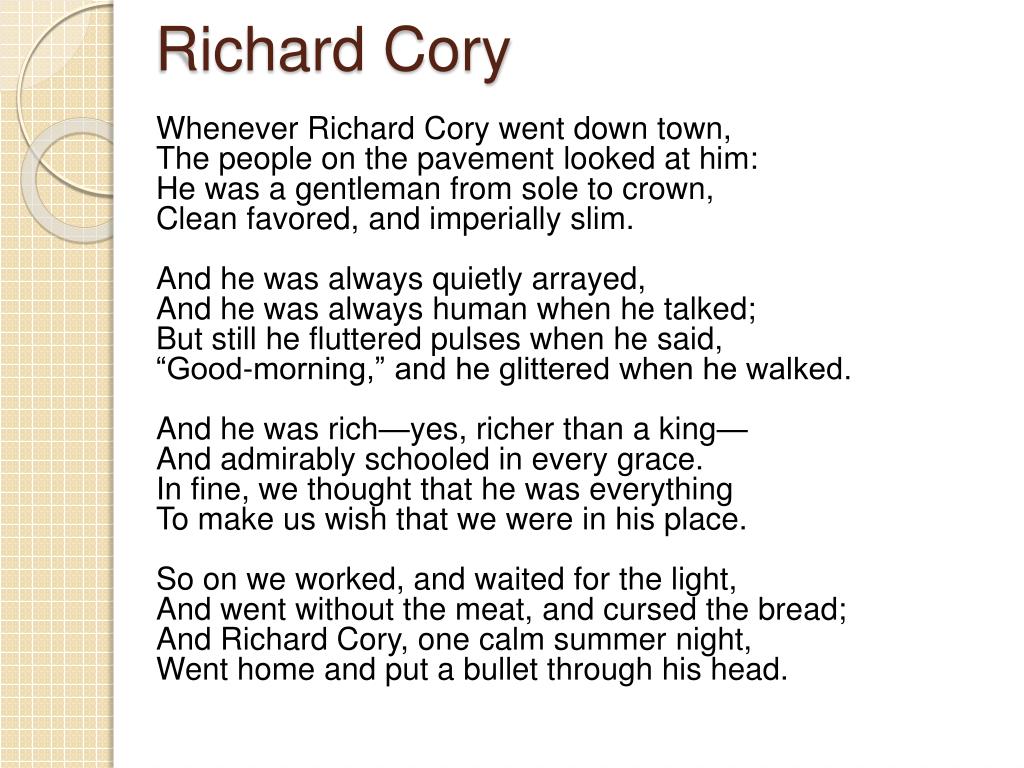
I remember reading it for the first time and being quite in shock when the poem came to an end. His poetry is so readable and in this poem it's especially the last line impact that appeals to me. However, with Robinson's poetry, this changed. About a year ago, I didn't like poetry at all, I was way more into prose. The poet portrays Cory’s outward appearance and grandeur not revealing the anguished deliberations he went through.To me, it's simply the most beautiful poem there is. It still remains a mystery as to what could have led to his death. Despite his status and reputation that followed him, he was driven to kill himself. ◤ The poet explains the main character as a man surrounded by wealth and glamor, but no one to turn to in his lonely moments. This became the background of the poem, focusing on the stark gap between the rich and the poor. was still suffering from the economic depression of 1893. The pavements, though, suggest that Richard Cory could have been an Englishman. The poet has used a fictional town named Tilbury. ◤ The poem does not specify the exact locale. Money cannot buy Joy―Richard Cory is a man whose riches could not buy him the peace and joy he so wanted, in turn, it only served to bring misery by way of isolation and envy.Perception―Here’s a man who owns everything under the sun which deems him as a happy man with not a care in the world however, his suicide proves otherwise.However, he is a lonely man but never once does he disclose it to anyone.

His grace and gentlemanly behavior makes him appear as one who is of noble descent.

It uses a simple abab, cdcd, efef, ghgh rhyme pattern. The poem is divided into four stanzas, each containing four lines. ◤ The poem’s structure is simple and classic. However, they are unaware that Cory shoots himself in the head one night. Their envy of Cory causes them to get so depressed that they curse their stale bread and their inability to buy meat. Frustrated and forlorn, they continue to work hard awaiting better days ahead. ◤ However, the harsh reality that they could never be like him stares right back at them. His appearance and polite behavior sows the seed of covetousness in people who aspire to be in his shoes. ◤ The poet describes him as being “richer than a king,” in terms of wealth and grooming alike. Even a casual “Good Morning!” from him stuns people into silence as his mere presence depicts an impression of glow around him. This does not in any way change the perception that people have of him.

◤ He never makes a public display of his wealth and is quite humble in his dealings with people. Richard Cory is described as a wealthy person with a touch of royalty which is represented in the poem with phrases like “crown”, “favored”, and “imperially”. He, by his elegant personality and impeccable manners, would make every head turn in his direction whenever he walked into town. He and the people in the town are in awe of Richard Cory, a rich and famous man. ◤ The narrator of the poem belongs to a lower class in society. – Edwin Arlington Robinson Literary Analysis Poem Summary So on we worked, and waited for the light, And went without the meat, and cursed the bread And Richard Cory, one calm summer night, Went home and put a bullet through his head. And he was always quietly arrayed, And he was always human when he talked But still he fluttered pulses when he said, “Good-morning,” and he glittered when he walked.Īnd he was rich-yes, richer than a king- And admirably schooled in every grace In fine, we thought that he was everything To make us wish that we were in his place.


 0 kommentar(er)
0 kommentar(er)
